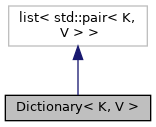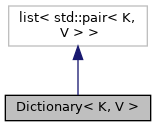 |
|
 |
|
Two-way mapping between strings and objects of template class T. More...
#include <Dictionary.h>


Public Types | |
| typedef K | key_t |
| typedef V | value_t |
| typedef std::pair< K, V > | entry_t |
| typedef std::list< entry_t > | container_t |
| typedef std::list< key_t > | keylist_t |
| typedef std::list< value_t > | valuelist_t |
Public Member Functions | |
| Dictionary (const Dictionary &d) | |
| Dictionary (std::initializer_list< entry_t > d) | |
| const container_t & | getContainer () const |
| entry_t & | add (const K &key, const V &value) |
| entry_t & | set (const K &key, const V &value) |
| Replaces existing or adds. | |
| const V & | operator[] (const K &key) const |
| const V & | operator() (const V &value) const |
| container_t::const_iterator | findByKey (const K &key) const |
| container_t::const_iterator | findByValue (const V &value) const |
| bool | hasKey (const K &key) const |
| bool | hasValue (const V &value) const |
| Given a key, return the first value associated with it. | |
| const V & | getValue (const K &key, bool lenient=true) const |
| Given a key, return the first value associated with it. | |
| const K & | getKey (const V &value, bool lenient=true) const |
| Identity mapping useful for type deduction of template arguments in functions. | |
| const keylist_t & | getKeys () const |
| void | getKeys (keylist_t &l) const |
| const valuelist_t & | getValues () const |
| void | getValues (keylist_t &l) const |
Public Attributes | |
| char | separator |
Protected Attributes | |
| keylist_t | keyList |
| valuelist_t | valueList |
Two-way mapping between strings and objects of template class T.
TODO: hide first and second so that an entry cannot be assigned to either of them Simple list based container for small dictionaries. Uses brute-force linear search.
In a way, works like std::map as each entry is a std::pair. However, no less-than relation is needed as the entries are not in order but appended sequentially.
For handling input and output, dictionary has a separator char which is a comma ',' by default.
|
inline |
Identity mapping useful for type deduction of template arguments in functions.
Consider setProperty(const T & prop) supporting both enum and string argument, for example.
const V & getValue(const V & value) const { return value; } Given a value, return the first key associated with it.
 1.9.8
1.9.8